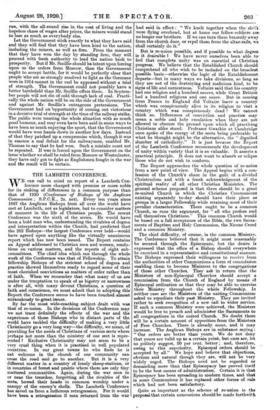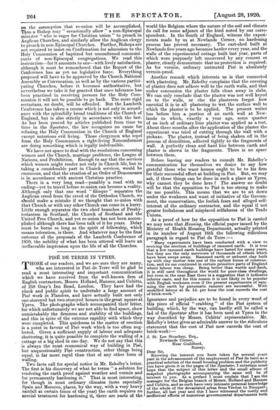THE LAMBETH CONFERENCE.
WE can call to mind no report of a Lambeth. Con- 11 v ference more charged with promise or more noble for its sinking of differences in a common purpose than that of 1920 (Conference of Bishops of the Anglican Communion ; S.P.C.K., 2s. net). Every ten years since 1867 the Anglican Bishops from all over the world have met at Lambeth, not as legislators, but to consider matters of moment in the life of Christian people. The recent Conference was the sixth of the series. He would have been a bold man who, understanding the rivalries of dogma and interpretation within the Church, had predicted that the 262 Bishops-'--the largest Conference ever held—would have agreed upon anything like the virtually unanimous report which has • now been issued. The Report contains an Appeal addressed to Christian men and women, resolu- tions on various matters, and the reports of eight sub- committees_ The chief idea which ran through the whole work of the Conference was that of Fellowship. To attain fellowship Bishops of the strictest school of dogma_ and practice showed themselves ready to regard _Some of their most cherished convictions as matters of order rather than of faith.. Whea we remember that what many of U.8 are under •the temptation to speak of as bigotry or narrowness is after all, with many devout Christians, a question of faith and conscience, we must. admit that in adopting this Report the Conference seems to have been touched.almost miraculously to. reat. issu es..
By far the. most wideereaching subject dealt with was that, of re-union, In the decisions of. the Conference may we not trace definitely the effects of. the war and the experience of those- Bich who in distant parts of the world have tackled the ru lay of making a very little Christianity go a very long way—the difficulty, we mean, of providing for the needs of Christians of various sects where perhaps not more than the ministry of one sect is repre- sented ? Exclusive Christianity may not seem to be a very cruel thing when it is practised in well populated countries. In our great towns he who finds he is not welcome in the church of one community can cross- the road and go to another. But it is a very different matter in a country of lonely sheep-stations, or in countries of forest and prairie where there are only tiny scattered communities. Again, during the war men in or near, the trenches, forgetting all the rivalries of the sects, bowed their heads in common worship under a canopy of the enemy's shells. The Lambeth. Conference has saved us from a ludicrous retrogression. For it would have been a retrogression if men returned from the wax had said in effect : " We knelt together when the ahel'i- were flying overhead, but at home our fellow-soldiers are.
nolonger our brothers. If we can turn them brazenly away from the church door, or repel them from the altar-rails, we shall certainly do it."
But is re-union possible, and if possible to what degree. is it desirable We have never ourselves been able to feel that complete unity was an essential of Christian. progress. We believe that the Established Church should: comprehend all who wish to be included on the broadest possible basis—otherwise the logic of the Establishment. departs—but in many ways we take divisions, so long. as they are not of the destroying and, malicious kind, to be signs of life and earnestness. Voltaire said that his country had one religion and a hundred sauces, while Great Britain had a hundred religions and one sauce. But in coming from France to England did Voltaire leave a country which was conspicuously alive in its religion to visit a country which was conspicuously dead ? We cannot think so. Differences of conviction and practice may mean a noble and holy emulation when they are not allowed to obscure the ground upon which all practising Christians alike stand. Professor Gwatkin at Cambridge once spoke of the energy of the sects being preferable to what he thought might be the alternative, the " dignified slumber of catholicity." It is just because the Report of the Lambeth Conference recommends the development of unity within variety that it is so valuable. It asserts a practical principle. It does not want to absorb or eclipse those who do not wish to conform.
The Report approaches the whole question of re-union from a new point of view. The Appeal begins with a con- fession of the Church's share in the guilt of a divided Christendom and with a frank acknowledgment of the spiritual reality of all other Christian Ministries. The general scheme proposed is that there should be a great re-united Church in which the Christian Communions existing separately to-day should have their place as groups in a larger Fellowship while retaining most of their peculiar characteristics. There ought to- be a common Church, so runs the argument, for " all who profess and call themselves Christians." This common Church would be based on a full acceptance of the Bible, the two Sacra- ments of Baptism and. Holy Communion, the Nicene Creed and a common Ministry.
The chief difficulty, of course, is the common Ministry. The Conference believed that it might most reasonably be secured through the Episcopate, but the desire is expressed that the office of a Bishop should everywhere be exercised in a representative and constitutional manner. The Bishops expressed their willingness to receive from the authorities of other Communions a form of commission enabling them to become Ministers to the congregations of those other Churches. They ask in return that the Ministers of non-Episcopal Churches should accept a commission from the Church of England by means of Episcopal ordination so that they may be able to exercise their Ministry throughout the whole, Fellowship. In neither case are the Ministers of the uniting Communions asked to repudiate their past Ministry. They are invited rather to seek recognition of a new call- to wider service, If such a common Ministry' were achieved, the Ministers would be free to preach and administer the Sacraments .to all congregations in the united Chun*. No doubt there will be a certain amount of opposition from the Ministers of Free Churches. There is already some, and it may increase. The Anglican Bishops are in substance saying " Our orders are better than yours. We do not deny that yours are valid up to 'a certain point, but ours are, let us politely suggest, 50 per cent. better ; and, therefore, owing to this superiority, Episcopal• orders should be accepted by all." We hope and believe that obje,ctionie obvious and natural though they are, will not be very widely urged. The Bishops need not be regarded as demanding more than that Episcopacy has proved itself to be the best means of administration. Certain it is that Episcopacy has been spreading in modern times, and that in some Communions it has replaced other forms of rule which had not been satisfactory.
Quite as important as the scheme of re-union is the proposal that certain concessions should be made forthwith on the assumption that re-union will be accomplished. Thus a Bishop may " occasionally allow " a non-Episcopal minister " who is eager for Christian union " to preach in Anglican Churches, and similarly allow the Anglican clergy to preach in non-Episcopal Churches. Further, Bishops are not required to insist on Confirmation for admission to the Holy Communion of baptized but unconfirmed communi- cants of non-Episcopal congregations. We read this instruction—for it amounts to one—with lively satisfaction, although it must be remembered that the Report of the Conference has as yet no legislative force. Everything proposed will have to be approved by the Church National Assembly or Convocation, as well as by the various partici- pating Churches, before it becomes authoritative, but nevertheless we take it for granted that once tolerance has been practised in receiving persons for the Holy Com- munion it will not be possible to go back. The more rigid sectarians, no doubt, will be offended. But the Lambeth Conference has taken a course which is not only in accord- ance with the splendidly broad traditions of the Church of England, but is also strictly in accordance with the law. As has been proved by articles published from time to time in the Spectator, the law recognizes no cause for refusing the Holy Communion in the Church of England except notorious evil living. Those clergymen who repel from the Holy Communion a right-living Nonconformist are doing something which is legally indefensible.
We have not space to deal with the resolutions concerning women and the Church, marriage problems, the League of Nations, and Prohibition. Enough to say that the services which women might render not only in Church life, but in taking a considerable part in Church services, would be enormous, and that the creation of an Order of Deaconesses is in accordance with ancient Christian practice.
There is a very long road—possibly a road with no ending—yet to travel before re-union can become a reality. Although only that one word " filioque " separates the Anglican creed from the creed of the Orthodox Church, we should make a mistake if we thought that re-union with that Church or with any other Church can come in a hurry. Little enough separates the two chief branches of Presby- terianism in Scotland, the Church of Scotland and the United Free Church, and yet re-union has not been accom- plished although there has been talk of it for years. Delay must be borne so long as the spirit of fellowship, which means toleration, is there. And whatever may be the final outcome of the proposals of the Lambeth Conference of 1920, the nobility of what has been uttered will leave an ineffaceable impression upon the life of all the Churches.



































 Previous page
Previous page